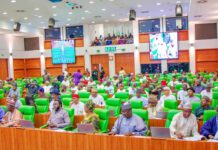Governor Abiola Ajimobi has been dragged to a High Court sitting in Ibadan by two Olubadan-in-Council over his plan to review the process of ascending to the Olubadan throne, thereby tinkering  with the 1957 Chieftaincy Law which stipulates succession order to the throne.
with the 1957 Chieftaincy Law which stipulates succession order to the throne.
The governor recently inaugurated a seven-member judicial commission of inquiry saddled with the responsibility of reviewing the existing requirements and qualification for ascendancy to the throne of Olubadan, as well as to review the selection process of Olubadan from Otun and Balogun lines.
The complainants are the Otun Olubadan of Ibadan, High Chief Lekan Balogun, and the Osi Olubadan of Ibadan, High Chief Rashidi Ladoja, a former governor of the state.
In the suit number m/317/2017, the chiefs are praying the court to restrain the commission from sitting, accepting any memorandum or in any way taking any step in furtherance of its assignment, pending the determination of a motion on notice in respect of the subject.
In the suit filed by their counsel, Michael Lana, on Friday, they claimed that the judicial panel constituted by Ajimobi under Sections 10, 12 and 25 of the Chiefs Law 2000 was invalid, as the governor lacked the power to change or amend the customary law relating to the selection of Olubadan.
They contended that the primary aim of the chiefs law was that traditional institutions must be guided and operated not in accordance with modern dictates as argued by the governor but by the customary rules of each community.
According to Ladoja and Balogun, only the chieftaincy committee, which made the 1957 Olubadan Declaration, and which must be peopled by recognised chiefs and not any judicial commission, could amend the law.
The claimants also said only two members of the panel are Ibadan indigenes, adding that it was improper for non-indigenes to determine issues relating to the emergence of the Olubadan.



